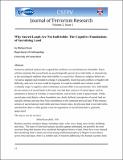Files in this item
Why sacred lands are not indivisible: the cognitive foundations of sacralising land
Item metadata
| dc.contributor.author | Sosis, Richard | |
| dc.date.accessioned | 2013-09-02T15:33:33Z | |
| dc.date.available | 2013-09-02T15:33:33Z | |
| dc.date.issued | 2011-02-02 | |
| dc.identifier.citation | Sosis, R. (2011). Why sacred lands are not indivisible: the cognitive foundations of sacralising land. Journal of Terrorism Research, 2(1), pp. 17-44. | en_US |
| dc.identifier.issn | 2049-7040 | en_US |
| dc.identifier.uri | http://ojs.st-andrews.ac.uk/index.php/jtr/article/view/172 | en_US |
| dc.identifier.uri | https://hdl.handle.net/10023/4034 | |
| dc.description.abstract | Numerous political analysts have argued that conflicts over sacred land are intractable. These scholars maintain that sacred lands are psychologically perceived as indivisible, or alternatively, in the sociological tradition, their indivisibility is a social fact. Moreover, religious beliefs are viewed as stagnant and resistant to change. Consequently, resolving such conflicts is fraught with difficulty, and even if a truce could be imposed, it would be unstable and violence would eventually erupt. A cognitive and evolutionary account offers a less pessimistic view. Individuals do not conceive of sacred lands in the same way that they conceive of sacred space, such as cemeteries or houses of worship, or sacred objects, such as holy water or prayer beads. Unlike sacred space and objects, whose boundaries are clearly defined, conceptions of sacred land are typically abstract and may bear little resemblance to the contested physical land. While abstract notions of sacred land are indivisible and must remain intact, the physical land is not indivisible, and therefore there is often greater room for negotiation of sacred lands than is generally appreciated. | en_US |
| dc.language.iso | en | en_US |
| dc.publisher | Centre for the Study of Terrorism and Political Violence, University of St Andrews | en_US |
| dc.relation.ispartof | Journal of Terrorism Research | en_US |
| dc.rights | This is an open access article published in Journal of Terrorism Research. This work is licensed under a Creative Commons Attribution 3.0 License (http://creativecommons.org/licenses/by/3.0/) | en_US |
| dc.rights.uri | http://creativecommons.org/licenses/by/3.0/ | |
| dc.subject | Religion | en_US |
| dc.subject.lcc | HV6431 | en_US |
| dc.subject.lcsh | Terrorism | en_US |
| dc.title | Why sacred lands are not indivisible: the cognitive foundations of sacralising land | en_US |
| dc.type | Journal article | en_US |
| dc.description.version | https://doi.org/Publisher PDF | en_US |
| dc.publicationstatus | Published | en_US |
| dc.status | Peer reviewed | en_US |
| dc.identifier.doi | https://doi.org/http://doi.org/10.15664/jtr.172 | en |
This item appears in the following Collection(s)
Except where otherwise noted within the work, this item's licence for re-use is described as This is an open access article published in Journal of Terrorism Research. This work is licensed under a Creative Commons Attribution 3.0 License (http://creativecommons.org/licenses/by/3.0/)
Items in the St Andrews Research Repository are protected by copyright, with all rights reserved, unless otherwise indicated.


